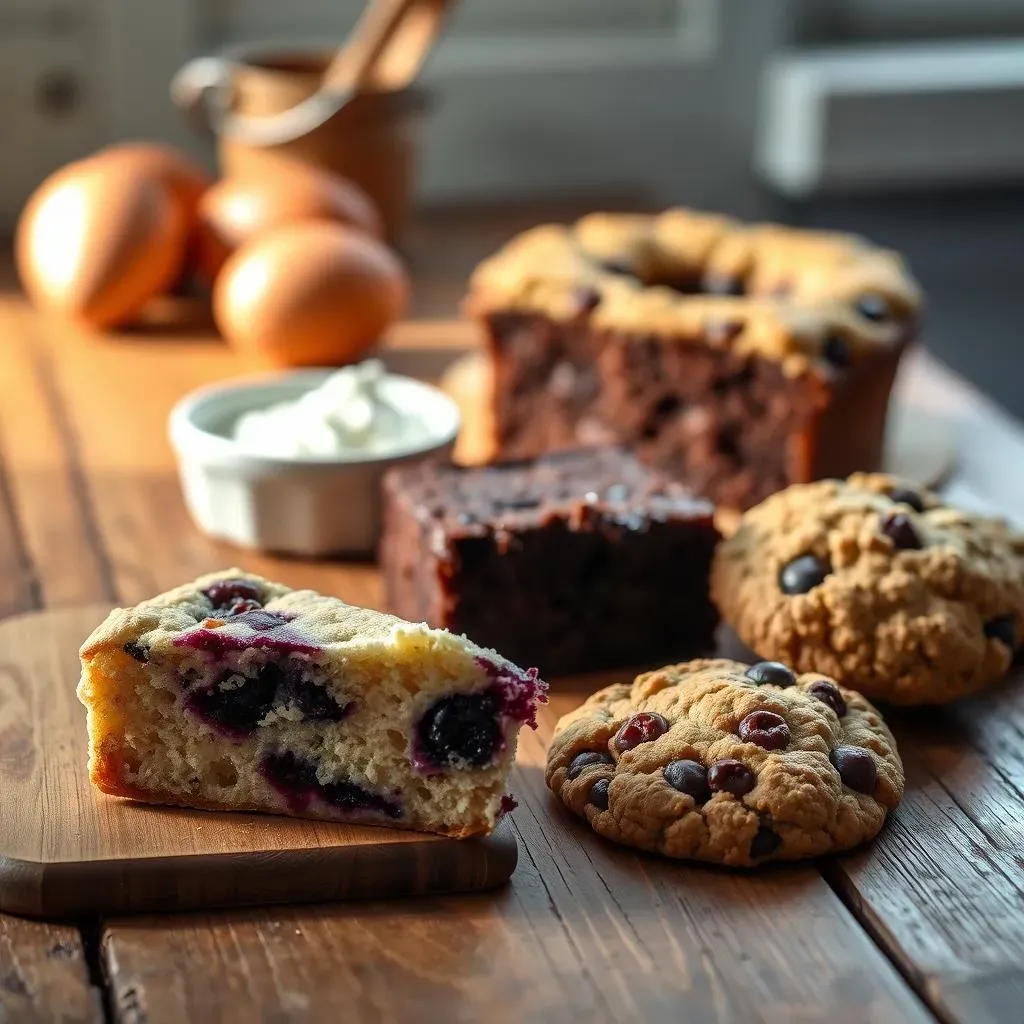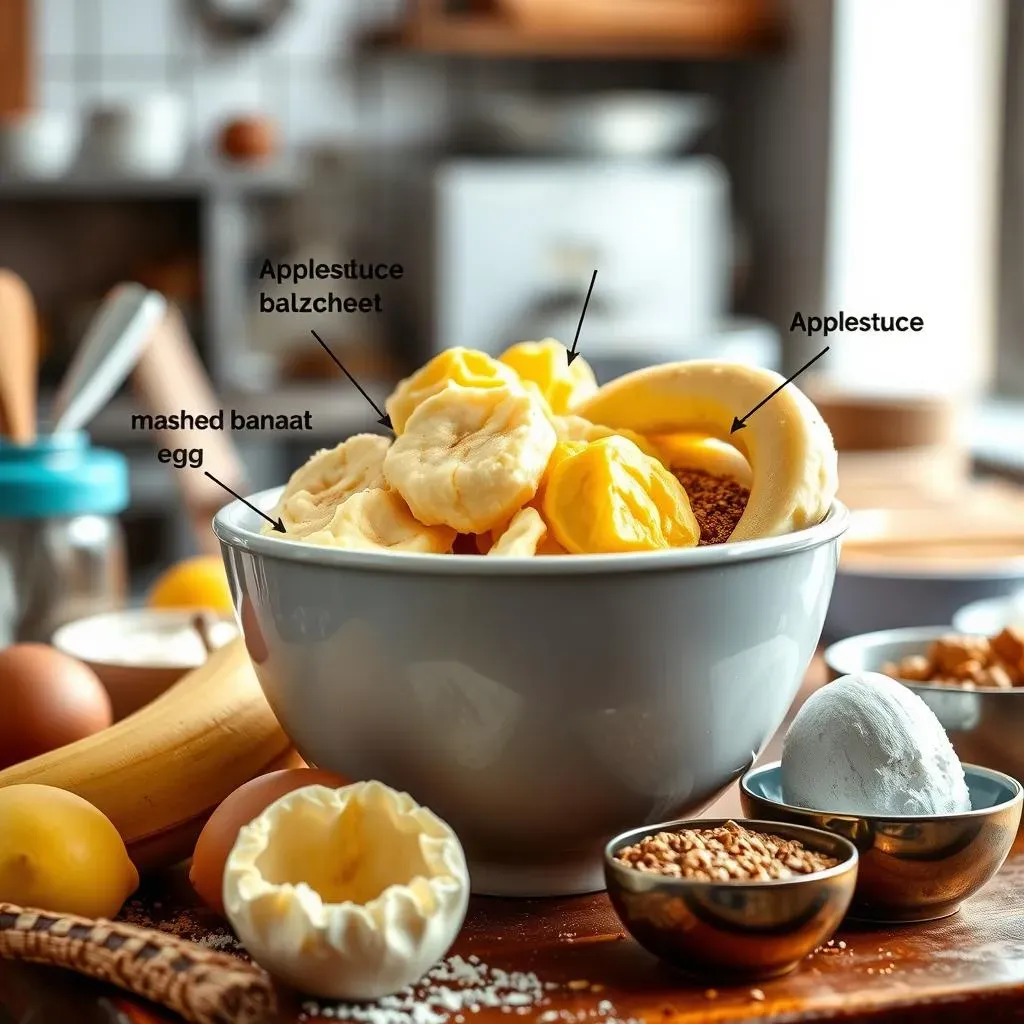Table of Contents
Ever stared blankly at a baking recipe, only to realize you're out of eggs? Don't despair, fellow bakers! We're tackling a burning question: can you substitute sour cream for eggs in baking? This isn't just about a simple swap; it's about understanding the crucial role eggs play in baking – from binding ingredients and adding moisture to creating lift and structure. This article will guide you through the complexities of substituting sour cream for eggs, exploring its impact on texture, moisture, and overall flavor. We'll delve into specific recipes where sour cream shines as a successful egg replacement and discuss situations where it might fall short. We'll also explore alternative substitutes and offer valuable considerations to help you make informed decisions in the kitchen. Get ready to unlock the secrets to delicious egg-free baking, and discover whether sour cream can truly become your new baking best friend. So, let's get started and find out if sour cream can be your baking hero!
Can You Substitute Sour Cream for Eggs in Baking? Understanding the Role of Eggs

Can You Substitute Sour Cream for Eggs in Baking? Understanding the Role of Eggs
Before we even THINK about swapping sour cream for eggs, let's talk about what eggs *actually* do in baking. They're not just there for protein; they're multi-tasking superstars! Eggs contribute to a recipe in several key ways: they bind ingredients together, creating a cohesive structure; they add moisture, leading to tender crumb; they provide richness and flavor; and, in some cases, they even help create lift and airiness, thanks to their protein's ability to trap air bubbles. Think of a cake – without eggs, you'd likely end up with a dry, crumbly mess. So, substituting sour cream for eggs isn't a simple one-for-one replacement; it's about finding a substitute that can mimic at least *some* of these crucial functions. The success of the substitution depends entirely on the recipe and the role eggs play in it. A recipe relying heavily on egg whites for volume might be a disaster with sour cream, while a recipe that uses eggs mainly for moisture might tolerate the swap better.
Egg Function | Impact on Baked Goods if Absent | How Sour Cream Might Compensate (Partially) |
|---|---|---|
Binding | Dry, crumbly texture; ingredients separate | Sour cream adds moisture, potentially improving binding slightly |
Moisture | Dry, dense texture | Sour cream adds significant moisture |
Leavening (airiness) | Flat, dense texture | Sour cream does NOT leaven; other methods needed |
Richness/Flavor | Bland, less flavorful | Sour cream adds richness and a slight tang |
Think of it like this: eggs are the glue, the moisturizer, and sometimes even the bouncy castle in your baking creation. Sour cream can step in as a partial replacement for the glue and moisturizer, but it definitely can't be the bouncy castle. Understanding this fundamental difference is key to successfully substituting sour cream for eggs (or any other ingredient for that matter!).
- Assess the role of eggs in your recipe.
- Consider the impact of sour cream's high fat and moisture content.
- Be prepared to adjust other ingredients, like flour or liquid, to compensate.
Sour Cream as an Egg Substitute: Texture, Moisture, and Flavor Impacts

Sour Cream as an Egg Substitute: Texture, Moisture, and Flavor Impacts
Moisture Magic: How Sour Cream Hydrates Your Baked Goods
Sour cream's superpower is its moisture content. Unlike eggs, which contribute moisture *and* other functions, sour cream is primarily a source of hydration. This means it can make your baked goods wonderfully moist and tender, especially in recipes where dryness is a common problem. Think dense muffins transforming into fluffy clouds, or cookies going from crisp to delightfully chewy. However, this moisture can also be a double-edged sword. Too much moisture can lead to a gummy or soggy texture, so you might need to adjust other ingredients (like flour) to achieve the perfect balance.
- Cakes: Sour cream can create a wonderfully moist and tender crumb.
- Muffins: Expect softer, more moist muffins, but watch out for sogginess.
- Cookies: Chewier, more tender cookies are possible, but adjust flour if needed.
Texture Tales: The Impact of Fat and Acidity
Sour cream isn't just water; it's a creamy blend of fat and mild acid. The fat content contributes to richness and a tender crumb, similar to the way egg yolks do. The slight tanginess adds a subtle complexity to the flavor profile, sometimes enhancing the overall taste experience. However, the fat can also alter the texture, potentially making baked goods denser or even slightly greasy if not balanced correctly with other ingredients. This is where careful recipe adjustment becomes crucial. For example, you might need to reduce the amount of oil or butter if the recipe already contains a significant amount of fat.
Ingredient | Impact with Sour Cream Substitution | Adjustment Strategy |
|---|---|---|
Flour | May need slight increase to absorb extra moisture | Start with a small increase and adjust as needed |
Sugar | May need slight reduction to balance sweetness and moisture | Reduce gradually; taste as you go |
Baking Powder/Soda | May need slight increase depending on recipe | Start with 1/4 teaspoon increase and monitor |
Flavor Fiesta: Enhancing or Overpowering?
Sour cream adds a subtle tang, which can complement certain flavors beautifully. Imagine the deliciousness of a tangy lemon poppy seed muffin, where the sour cream enhances the lemon's brightness. In other recipes, however, that tang might clash or overpower more delicate flavors. It's crucial to consider the overall flavor profile of your recipe before making the substitution. If you're working with a delicate flavor profile, a less acidic alternative might be a better choice. Experimentation is key! Start with a small batch to test the flavor and texture before committing to a large quantity.
Successful Substitutions: Recipes Where Sour Cream Shines in Place of Eggs

Successful Substitutions: Recipes Where Sour Cream Shines in Place of Eggs
Cakes and Muffins: A Moist and Tender Transformation
Let's be honest, sometimes you just crave a moist, tender cake or muffin. Sour cream is surprisingly adept at delivering that experience, particularly in recipes that already lean towards a rich, dense texture. The high fat content emulsifies beautifully, creating a tender crumb that practically melts in your mouth. Recipes like chocolate cakes, carrot cakes, and blueberry muffins are particularly well-suited to a sour cream egg substitution. The slight tanginess of the sour cream can even complement the sweetness of these baked goods, adding an unexpected layer of flavor complexity. Remember, though, to adjust the amount of liquid in your recipe to account for the added moisture from the sour cream. You might also need to add a bit more leavening agent to compensate for the lack of egg-based lift.
Recipe Type | Sour Cream's Benefit | Potential Adjustments |
|---|---|---|
Chocolate Cake | Incredibly moist and rich crumb | Reduce liquid slightly; may need extra baking powder |
Carrot Cake | Adds moisture and complements spices | Reduce liquid slightly; consider adding a pinch of cinnamon |
Blueberry Muffins | Soft, tender crumb; enhances blueberry flavor | Reduce liquid slightly; may need extra baking soda |
Cookies: Chewy Delights
While sour cream might not be the best choice for crisp cookies, it can work wonders in creating chewy, decadent treats. Think oatmeal raisin cookies, chocolate chip cookies, or even peanut butter cookies. The fat and moisture from the sour cream contribute to a wonderfully soft and chewy texture, almost like a brownie-cookie hybrid. Again, you'll likely need to adjust the flour content to compensate for the extra moisture, and you might need to bake them slightly longer to ensure they're fully cooked through. The slight tanginess from the sour cream often gets lost in the overall sweetness of the cookie, but it adds a subtle complexity that elevates the overall experience.
- Oatmeal Raisin Cookies: Enhanced chewiness and moisture
- Chocolate Chip Cookies: Softer, chewier texture
- Peanut Butter Cookies: Richer, more decadent flavor and texture
Can You Substitute Sour Cream for Eggs in Baking? Alternatives and Considerations

Can You Substitute Sour Cream for Eggs in Baking? Alternatives and Considerations
Beyond Sour Cream: Exploring Other Egg Replacements
While sour cream can work in certain situations, it's not a universal egg replacement. Many other options exist, each with its own strengths and weaknesses. Applesauce, for instance, adds moisture and sweetness, making it ideal for cakes and muffins. Mashed banana offers similar properties, but with a more pronounced banana flavor. Flaxseed "eggs" (ground flaxseed mixed with water) provide binding and some moisture, but they can impart a slightly earthy flavor. Commercial egg replacers offer a convenient option, but always check the ingredients to ensure they align with your dietary needs and preferences. The best replacement often depends on the specific recipe and the role the eggs play. Sometimes, a combination of substitutes might be necessary to achieve the desired results. Don't be afraid to experiment!
Egg Replacement | Best Uses | Potential Drawbacks |
|---|---|---|
Applesauce | Cakes, muffins, quick breads | Adds sweetness; may alter flavor |
Mashed Banana | Cakes, muffins, quick breads | Strong banana flavor; may not be suitable for all recipes |
Flaxseed "Egg" | Binders, some moisture | Earthy flavor; may not be suitable for all recipes |
Commercial Egg Replacer | Versatile; check ingredients | May contain additives; cost |
Recipe Adjustments: Fine-Tuning for Success
Even with a suitable egg replacement, recipe adjustments are often necessary to achieve optimal results. Sour cream, for example, adds significant moisture, so you might need to reduce the amount of other liquids in your recipe. Similarly, the fat content of sour cream can impact the overall texture, requiring adjustments to flour or other fat sources. Baking is a science, and understanding how ingredients interact is crucial for success. Always start by making small adjustments, testing as you go, and don't be afraid to experiment until you find the perfect balance. Remember that even with careful adjustments, the final product might not be exactly the same as the original recipe. Sometimes, the best approach is to accept that the result will be slightly different and enjoy the new flavor profile. It's all part of the baking adventure!
- Reduce liquid if using a moist substitute like sour cream or applesauce.
- Adjust flour to compensate for changes in moisture content.
- Consider adding extra leavening agent if needed.
- Taste and adjust as you go. Don't be afraid to experiment!
When Sour Cream Simply Won't Work: Knowing Your Limits
Let's face it: some recipes are just not compatible with sour cream as an egg substitute. Recipes that rely heavily on egg whites for leavening (like meringues or soufflés) are simply out of the question. Similarly, recipes where eggs play a crucial role in creating a specific texture (like custards or quiches) will likely not yield satisfactory results with sour cream. In these cases, it's best to explore other egg replacements or simply find an alternative recipe that doesn't require eggs. Knowing your limits is just as important as knowing your possibilities. There's no shame in admitting defeat and seeking a more suitable approach. Sometimes, the best solution is to simply accept that certain recipes are best left as they are, or to find alternative recipes that don't require eggs. A good baker knows when to adapt and when to find a new recipe altogether.